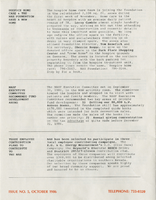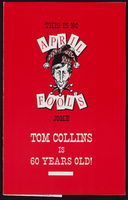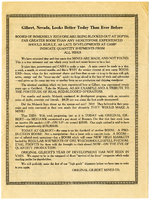Search the Special Collections and Archives Portal
Search Results
Catherine Hunt oral history interview
Identifier
Abstract
Oral history interview with Catherine Hunt conducted by Dennis Hunt on March 2, 1980 for the Ralph Roske Oral History Project on Early Las Vegas. Catherine discusses growing up in Las Vegas, Nevada and experiencing the Korean War during her teenage years. She then talks about women’s rights and the Equal Rights Amendment.
Archival Collection
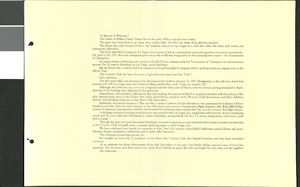
Desert Inn Country Club family album, page 01
Description
Printed text about the Desert Inn Country Club. The paragraph reads: "'A Beacon of Welcome.' This motto of Wilbur Clark's Desert Inn in the early 1950s is apropos even today. The years have been kind to us. Sure, we're a little older, but who can forget those glorious seasons? The Desert Inn and Country Club is the brightest beacon in Las Vegas as a club that offers the finest golf course and community fellowship. The PGA and LPGA recognizes the Desert Inn Country Club as a playland for some of its greatest innovative tournaments. On April 23-26, 1953, the most prestigious golf event in the world was inaugurated on this spanking-new course - the Tournament of Champions. Its unique format of allowing only winners of the PGA Tour compete made the Tournament of Champions an instantaneous success. For 16 years it flourished as Las Vegas' sports headliner. But the Desert Inn Country Club has remained in the golf limelight by staging brilliant, exciting events as regular stop on the LPGA Tour. The Country Club has been the scene of gala festivities since that first T-of-C. Let's reminisce... Our first social affair was featured in the Skyroom of the hotel on January 25, 1957. Membership in the club was closed that evening with 194 Las Vegas men and women holding membership cards. Today we number 275. Although the clubhouse was not to be completed until the latter part of March, with the formal opening scheduled in April, sketches of the building were displayed at the gathering. Allard Roen, club president, officiated at that first meeting, the purpose of which to acquaint members with the policies of the club. Introductions went to Moe Dalitz; Mrs. Helen (Jack) Doyle, president of the Women's Golf Association; and Merv Adelson, director and handicap chairman of the Men's Golf Association. Remember the awards ceremony? That was Mrs. Carmen Colahan and Jim Henderson who presented the trophies to Myron Friedman and Mrs. Roen for their victories in the 1956 men's and women's championship flight divisions. Mrs. Rose (Bill) Holler, winner of numerous tournaments to follow and honored by having an event named after her, was the woman's first-flight winner. A full-page account of our first social function was carried in the Las Vegas Sun, resplendent with pictures. An accompanying article said the new clubhouse "will feature a variety of facilities, among which will be a TV room, dining room, card room, a grill and a lounge." Through the years we have formulated friendships, renewed acquaintances and cemented relationships at numerous festivities in the Country Club and grill room, a popular gathering place to hash things over. We have celebrated and shared our moments at New Year's Eve parties, Grand Balls, Halloween parties, Easter egg hunts, Mexican Fiestas, installation ceremonies and at many other functions. This evening is something special, too. For tonight we honor the 25 presidents of the Desert Inn Country Club who helped formulate and host these wonderful occasions. As we celebrate this Silver Anniversary of our club, let's reflect on the past. Our Family Album captures many of those fine moments. Yes, the years have been kind to us. Some of our friends are gone. But who can forget the nice times we had together? Ah, memories...

Transcript of interview with Sari and Paul Aizley by Claytee D. White, November 4, 2016
Date
Archival Collection
Description
As Sari and Paul Aizley recall their separate childhoods and journeys to Las Vegas, their work and volunteer histories, their efforts to build a better society, and their life together they speak to each other as much as they respond to questions about their observations on the growth of the Las Vegas urban environment and their contributions to Southern Nevada's cultural development and a just society. In this interview, Sari and Paul speak to the cross-town commute and the physical UNLV campus in the late 1960s; the growth of the UNLV Math Department; the evolution of UNLV's Continuing Education; the State's North-South funding rivalry as reflected in the built environments of University of Nevada in Las Vegas and in Reno; plans to build a paleontology research facility at Tule Springs National Monument; the Review-Journal's "Ask Jessie Emmet" Real Estate column; local ACLU offices and politics; Fair Housing; transgendered persons; the Nevada State Assembly, and Class! magazine for Clark County high school students. Sari and Paul smile at each other as they recall how the editor/publisher met the bearded math professor and fell in love—despite the fact that they tell slightly different versions of their initial meeting(s). Sari passed away November 1, 2017, three days shy of one year after she participated in this interview.
Text
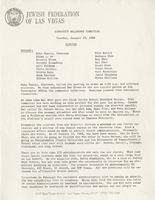
Jewish Federation correspondence, meeting minutes, and other records, item 10
Description
Community Relations Committee meeting minutes for the Jewish Federation of Las Vegas, Nevada, January 19, 1988.
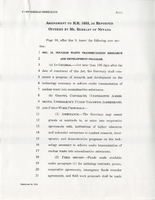
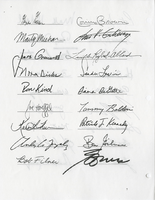

Robert Kim oral history interview: transcript
Date
Archival Collection
Description
Oral history interview with Robert Kim conducted by Kristel Peralta, Cecilia Winchell, Ayrton Yamaguchi, and Vanessa Concepcion on March 05, 2021 for the Reflections: The Las Vegas Asian American and Pacific Islander Oral History Project. In this interview, Kim describes his career in law. He talks about his Korean roots, the model minority myth, and experiencing racial discrimination. Lastly, Kim discusses the Las Vegas Asian American and Pacific Islander (AAPI) community, his involvement with the Asian Bar Association of Las Vegas, and the importance of electing Asian Americans into political positions.
Text

